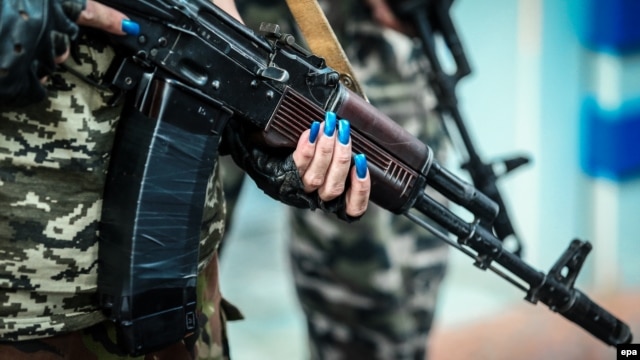Ukraine tense as diplomats gather in Berlin
| Publisher | Radio Free Europe/Radio Liberty |
| Publication Date | 17 August 2014 |
| Cite as | Radio Free Europe/Radio Liberty, Ukraine tense as diplomats gather in Berlin, 17 August 2014, available at: https://www.refworld.org/docid/54003f1418.html [accessed 28 May 2023] |
| Disclaimer | This is not a UNHCR publication. UNHCR is not responsible for, nor does it necessarily endorse, its content. Any views expressed are solely those of the author or publisher and do not necessarily reflect those of UNHCR, the United Nations or its Member States. |
August 17, 2014
By RFE/RL
 A member of the self-declared Donetsk People's Republic militia holds a Kalashnikov automatic rifle at a checkpoint in Donetsk on August 15.
A member of the self-declared Donetsk People's Republic militia holds a Kalashnikov automatic rifle at a checkpoint in Donetsk on August 15.
Tensions were ratcheted up again ahead of major diplomatic talks on Ukraine, as fierce fighting continued in the country's east and columns of heavy weapons appeared in separatist-held areas.
Pro-Kyiv forces appeared determined to build on gains on the ground during a major offensive against separatist forces in recent weeks.
Ukrainian military officials said government forces seized a police station on August 17 in the rebel-held city of Luhansk, where a pro-Russian mob occupied that and other government buildings in early April.
Luhansk, located on the border with Russia, has been under the control of pro-Russian separatists since then.
The city is now encircled by Ukrainian forces.
Ukrainian officials have accused Russia of sending fresh military equipment, including rocket launchers, across the border into eastern Ukraine over the past two days.
A column of vehicles that included tanks and at least one antiaircraft gun was meanwhile spotted entering Donetsk. Part of that convoy can be seen in this YouTube video uploaded by the "Kyiv Post's" Christopher Miller:
Ukrainian military spokesman Andriy Lysenko said on August 17 that "a convoy of military equipment, including three Grad rocket launchers, have crossed into the territory of Ukraine" and continued on to the village of Nizhniy Nagolchyk in southern Luhansk.
A Kremlin spokesman the same day denied rebel claims of Russia sending equipment and fighters into eastern Ukraine.
The denial by Dmitry Peskov came after on August 16, Aleksandr Zakharchenko, prime minister of the self-proclaimed Donetsk People's Republic, said rebels were in the process of receiving some 150 armored vehicles, including 30 tanks, and 1,200 fighters trained in Russia.
Ukrainian officials also said on August 17 that a Ukrainian fighter plane had been shot down over the Luhansk region. They said the pilot ejected and was rescued by Ukrainian forces.
Meanwhile, the International Committee of the Red Cross (ICRC) announced it would "observe" after Russian and Ukrainian border and custom officials agreed to conduct a joint inspection of a first group of trucks from Russia's humanitarian convoy for Ukraine.
Russian news agencies reported that a group of 16 trucks from the nearly 300-truck convoy split off and approached the checkpoint on the Russian side of the border.
The Ukrainian Security and Defense Council issued a statement at 5:15 local time stressing that Ukrainian customs officers required documents that had not been produced and the situation around the Russian "'humanitarian convoy' [was] unchanged."
Earlier, an ICRC representative in Moscow said its inspectors had arrived at the location where the Russian aid convoy was parked but that inspections to determine their contents were unlikely to begin for another day or more.
The convoy has been marooned for days amid objections from Ukraine, which has insisted that the mission be conducted under the auspices of the ICRC.
The ICRC said it was waiting to receive security guarantees from the fighting parties in eastern Ukraine before the convoy is allowed to enter Ukraine under the aegis of the Red Cross.
The foreign ministers of Ukraine, Russia, Germany, and France were expected to meet in Berlin late on August 17 to discuss the Ukrainian crisis.
German Foreign Minister said earlier in the day that while the humanitarian situation merited attention, "we must not neglect the search for political ways out of the crisis in Ukraine. We urgently need new political impetus – otherwise we run the risk of treading water, or of going backward and re-entering an intensified spiral of escalation."
He added: "It is all about finding a road map toward a sustainable cease-fire and a framework for effective border controls."
Ukrainian Foreign Minister Pavlo Klimkin said via Twitter before flying to Berlin that "talk is easy" and that "now [it is] extremely important to stop the flow of arms and mercenaries from Russia."
In addition to Steinmeier and Klimkin, the meeting was to be attended by Russian Foreign Minister Sergei Lavrov and French Foreign Minister Laurent Fabius..
With reporting by AFP, AP, Reuters, and ITAR-TASS
Link to original story on RFE/RL website
